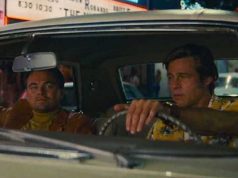
Hijacking an airplane was trendy in the 1970s, and evidently not very hard. The incident recreated in “7 Days in Entebbe,” from 1976, was at least the 40th hijacking of the decade, perpetrated by two Palestinians and two German revolutionaries hoping to pressure Israel into releasing political prisoners. The film, directed by José Padilha (whose first movie was the Brazilian hijacking documentary “Bus 174”), feels like it was made out of obligation, like someone was contracted to deliver a certain number of based-on-a-true-story movies and had to crank one out on deadline. It’s made competently but not enthusiastically.
Rosamund Pike and Daniel Brühl play the Germans, Brigitte and Wilfried, who are terrorists but the really nice kind. “We are humanitarians,” Wilfried says to the cabin full of terrified air travelers, brandishing a machine gun that he hopes they don’t make him use. Part of the movie’s problem is that it’s too timid to take sides, assuring us that one nation’s “terrorists” are another nation’s “freedom fighters” and leaning heavily on the Germans’ basic decency. Rational, nonviolent hijackers make for poor drama, though. Even when the passengers have been offloaded to an airport in Entebbe, Uganda, under the auspices of insane warlord Idi Amin (Nonso Anozie), their situation never feels particularly dangerous.
Meanwhile, in Jerusalem, Prime Minister Yitzhak Rabin (Lio Ashkenazi) and defense minister Shimon Peres (Eddie Marsan) huddle with advisers to plan a rescue mission while grappling with the usual questions of whether we negotiate with terrorists (we don’t but maybe we should) and how this is going to play out long-term. “Our enemies are our neighbors,” Rabin says. “We can’t get away from them.” These discussions are where the true drama lies, not in the hopes and dreams and flashbacks of the German hijackers. Padilha, working from a by-the-numbers screenplay by Gregory Burke (“’71”), delivers tension and heroics when the time comes, but he never gives us a reason to care about this particular incident or the people involved in it.
C (1 hr., 47 min.; )





